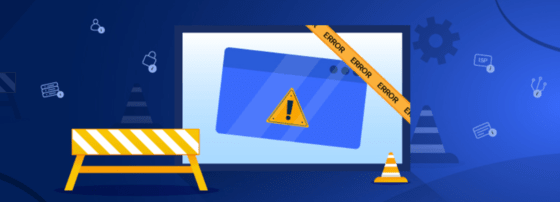| 0 Comments |

Website Maintenance Best Practices: Strategies to Prevent Downtime and Enhance
In today's digital age, a well-maintained website is essential for any business or organization aspiring to thrive online. With the constant evolution of technology and the ever-changing landscape of the internet, website maintenance has become more than just improving bugs or revamping content—it's about assuring seamless functionality, preventing downtime, and enriching the user experience. In this blog by Vencon Solutions, we will delve into some best practices for website maintenance that can help you keep your site operating smoothly and delighting visitors.
Importance of Website Maintenance
Understanding the significance of website maintenance is crucial before delving into strategies. Your website serves as the initial point of contact between your brand and potential customers. A poorly maintained site, characterized by broken links, outdated content, or slow loading times, can deter visitors and damage your brand's reputation. Conversely, a well-maintained website leaves a positive impression, instills trust, and promotes engagement. Essential steps like keeping content fresh, ensuring link functionality, and optimizing loading speeds are pivotal in delivering a satisfying user experience. A meticulously maintained website not only showcases professionalism but also cultivates trust and interaction with your audience.
Regular Backup and Updates
One of the fundamental aspects of website maintenance is regular backups and updates. Backing up your website's data ensures that you have a copy of your content, files, and databases in case of unexpected events like server crashes, hacks, or data loss. Similarly, keeping your website software, including content management systems (CMS), plugins, and themes, up to date is crucial for security and performance.
Monitoring and Performance Optimization
Monitoring your website's performance is key to identifying issues before they escalate. Utilize tools like Google Analytics, or any other tools to track metrics such as page load times, bounce rates, and server uptime. By analyzing this data, you can pinpoint areas that need improvement and optimize your website for better performance.
Security Measures
Cybersecurity threats are ever-present in the digital landscape. Protecting your website from malicious attacks, malware, and data breaches should be a top priority. Implement robust security measures such as using HTTPS, installing firewalls, regularly scanning for vulnerabilities, and employing strong authentication methods. Additionally, educate yourself and your team about common security threats and best practices for prevention.
Content Management
Content is king in the online world, and regularly updating and refreshing your website's content is essential for engaging visitors and improving search engine rankings. Develop a content management strategy that includes creating new content, updating existing pages, and removing outdated or irrelevant information. Ensure that your content is relevant, accurate, and optimized for search engines to attract organic traffic.
Mobile Optimization
With the increasing use of smartphones and tablets, optimizing your website for mobile devices is no longer optional but it is essential. A responsive design ensures that your site displays correctly and functions seamlessly across various screen sizes and devices. Test your website on different mobile platforms to ensure a consistent user experience regardless of the device used.
User Experience Enhancement
User experience (UX) plays a significant role in determining the success of your website. A well-designed, intuitive interface enhances usability and keeps visitors engaged. Conduct user testing to gather feedback and identify areas for improvement. Pay attention to factors such as navigation, page layout, readability, and accessibility to create a positive and enjoyable user experience.
Regular Testing and Quality Assurance
Before deploying any changes or updates to your website, it's crucial to thoroughly test them to ensure they work as intended. Conduct testing across multiple browsers, devices, and screen resolutions to identify any compatibility issues. Additionally, perform regular quality assurance checks to catch bugs, broken links, or other issues that may affect the user experience.
Scalability and Future-Proofing
As your business grows, your website needs to scale accordingly to accommodate increased traffic, functionality, and data. Plan for scalability by choosing a flexible hosting solution, implementing efficient coding practices, and regularly reviewing your website's architecture. Future-proof your website by staying abreast of emerging technologies, trends, and best practices in web development.
Website maintenance is an ongoing process that requires diligence, attention to detail, and proactive measures to ensure optimal performance and user experience. By following the best practices outlined in this blog post by Vencon Solutions, you can prevent downtime, enhance security, and delight visitors with a seamless and engaging online experience. Remember, investing in website maintenance is investing in the success of your business in the digital realm.
Investing in meticulous website maintenance is akin to nurturing the foundation of your business's success in the digital landscape. By dedicating attention to the upkeep and enhancement of your online presence, you're effectively fortifying your brand's credibility, visibility, and overall performance in the competitive digital realm.
A well-maintained website serves as the virtual storefront, the primary point of interaction between your brand and potential customers in the vast digital marketplace. It acts as a reflection of your business's ethos, values, and commitment to excellence. Conversely, neglecting regular upkeep can lead to a myriad of issues that undermine your brand's reputation and hinder growth opportunities.
Beyond the immediate benefits of user experience and marketing efficacy, website maintenance also plays a crucial role in safeguarding your business against security threats and vulnerabilities. Regular updates and patches ensure that your website remains resilient against cyberattacks, safeguarding sensitive data and preserving customer trust.
In essence, investing in website maintenance is investing in the long-term success and sustainability of your business in the digital age. By prioritizing the upkeep of your online presence, you're not only fostering a positive brand image but also laying the groundwork for continued growth, innovation, and adaptability in an ever-evolving digital landscape.

(0) comments for "Website Maintenance Best Practices: Strategies to Prevent Downtime and Enhance"
Leave a Reply